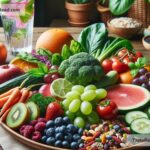The Benefits of a Balanced Diet for Muscle Health: Supporting Muscular Function
Muscles play a big role in how our bodies move, feel, and work every day. Whether you’re an athlete, a gym-goer, or just trying to stay healthy, your muscles need the right fuel to perform their best. That’s where a balanced diet comes in. What you eat directly affects muscle health and overall body function. Let’s dive into the key benefits of eating balanced meals for healthy, strong muscles—and how you can start supporting them today.
What Is a Balanced Diet?
A balanced diet means eating a variety of foods in the right amounts to give your body all the nutrients it needs. This includes:
- Proteins: Found in foods like chicken, fish, eggs, beans, and tofu, protein is essential for building and repairing muscles.
- Carbohydrates: These are your body’s main source of energy, found in items like rice, bread, sweet potatoes, and fruits.
- Healthy Fats: Fat isn’t bad when you choose sources like nuts, avocado, olive oil, and fatty fish. Fats help your body absorb certain vitamins.
- Vitamins and Minerals: Fruits, vegetables, and whole grains provide important nutrients like calcium, magnesium, and vitamin D that keep muscles strong.
- Hydration: Water is just as important as food. Your muscles need plenty of water to stay flexible and function properly.
Eating meals that combine these groups can help your body stay in top shape—including your muscles.
Why Muscles Need a Balanced Diet
To understand the importance of diet for muscle health, imagine your body as a car and your muscles as the engine. Without the right fuel, the engine doesn’t run smoothly. Here are the ways a balanced diet helps muscles stay healthy and strong:
1. Rebuilding Muscle Fibers
Every time you exercise or do any physical work, your muscle fibers experience tiny tears. This is completely normal! Protein is crucial for fixing these tears and making muscles bigger and stronger. By eating protein-rich foods after a workout, you give your body the tools it needs to repair and grow.
2. Giving Muscles Energy
Carbohydrates provide the energy your body and muscles use during workouts or daily tasks. Without enough carbs, your body might burn muscle tissue for energy, which isn’t ideal. Whole grains, fruits, and starchy vegetables are great options to keep your muscles fueled.
3. Reducing Muscle Cramps and Fatigue
Ever had a painful muscle cramp? It might be because your body lacks important minerals like potassium, calcium, or magnesium. These minerals play a big role in helping muscles contract and relax smoothly. Eating foods like bananas, spinach, and dairy can lower the risk of cramps and keep your muscles working efficiently.
4. Fighting Muscle Loss
As we grow older, our muscles naturally lose strength. However, a balanced diet can help slow down this process. Protein and healthy fats keep muscles strong, while vitamin D and calcium support bone health—important for overall movement and balance.
5. Staying Hydrated
Water keeps muscles flexible and helps them recover faster after exercise. Proper hydration also reduces soreness and helps deliver nutrients to muscle tissue.
Simple Tips for a Muscle-Friendly Diet
Supporting muscle health doesn’t have to be complicated. Here are some easy tips to follow:
1. Prioritize Protein
Make sure each meal includes a good source of protein. For example:
– Breakfast: Scrambled eggs or Greek yogurt
– Lunch: Grilled chicken or chickpea salad
– Dinner: Fish or tofu stir-fry
2. Choose Whole, Unprocessed Foods
Processed foods, like chips and sugary snacks, don’t provide much nutrition. Focus on whole, natural foods like fruits, vegetables, whole grains, and lean proteins.
3. Don’t Skip Carbs
While low-carb diets are popular, your muscles need carbs for energy. Add options like brown rice, quinoa, or sweet potatoes to your meals.
4. Eat Fruits and Vegetables Daily
These are packed with vitamins, minerals, and antioxidants that keep muscles healthy. Leafy greens, berries, and oranges are great choices.
5. Stay Hydrated
Drink water throughout the day, especially before and after exercising. If you sweat a lot, consider coconut water for added electrolytes.
6. Snack Smart
When hunger strikes between meals, go for snacks like nuts, seeds, boiled eggs, or fruit. These are full of nutrients that support muscles without adding empty calories.
7. Don’t Forget Healthy Fats
Fat isn’t the enemy. Include sources like avocado, salmon, and olive oil to help your body absorb vitamins like A, D, and E, which are essential for muscle recovery.
The Big Picture
A balanced diet is key to maintaining healthy muscles and supporting overall body function. By eating the right mix of proteins, carbs, fats, vitamins, and minerals, you can keep your muscles strong, energized, and ready to perform.
Remember: your diet doesn’t only affect how your muscles look—it affects how they feel and work. No matter your age or activity level, making smart food choices can improve muscle strength, reduce cramps and fatigue, and protect against muscle loss in the long run. Combine healthy eating with regular exercise and proper hydration, and your muscles will thank you!
So, the next time you sit down to eat, think of your meal as a way to fuel your muscles. By taking care of what goes into your body, you’re setting yourself up for better movement, energy, and strength for years to come. Keep it simple, keep it balanced, and keep your muscles moving!

